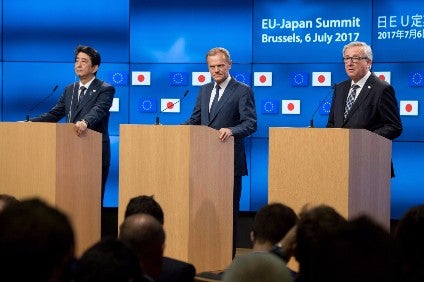
The EU and Japan have today (6 July) announced an agreement “in principle” on trade between the two markets.
The “main elements” of the deal were out, although in some areas technical details still need to be agreed.

Discover B2B Marketing That Performs
Combine business intelligence and editorial excellence to reach engaged professionals across 36 leading media platforms.
In a joint statement, European Council President Donald Tusk, European Commission President Jean-Claude Juncker and Japan Prime Minister Shinzo Abe said the agreement would “bring our two economies closer”, adding: “This agreement will allow us to renew and strengthen our joint commitment to international standards for an even closer cooperation in the future.”
In a separate statement, the EU said the deal already makes provisions for the duties on certain cheeses, including Gouda and Cheddar, to be scrapped.
The countries will install duty-free trade in processed meat and almost duty-free trade for fresh meat.
The EU also said the agreement would allow its member states to increase their beef exports to Japan “substantially”. It added the agreement “ensures the protection in Japan of more than 200 high-quality European agricultural products”.

US Tariffs are shifting - will you react or anticipate?
Don’t let policy changes catch you off guard. Stay proactive with real-time data and expert analysis.
By GlobalDataPhil Hogan, the EU’s Agriculture and Rural Development Commissioner, described the deal as “the most significant and far-reaching agreement ever concluded in agriculture”. He added: “We are setting a new benchmark in trade in agriculture.”
Japan has agreed to drop tariffs on hard cheeses over 15 years. Over the same period, Tokyo will increase the tariff-rate quota for soft cheese from 20,000 tons to 100,000 tons. Japan will also reduce its 38% tariff on EU beef imports, taking it down to 9%.
The European Dairy Association trade body “welcomed” the deal but said it was awaiting more information.
“The conclusion of the EU-Japan free-trade agreement is a good sign for Europe, for Japan and for the global trade, especially since the Trans-Pacific Partnership has failed to be implemented for the time being,” Alexander Anton, the association’s secretary general, said.
However, Anton added: “Now, the issues come – as always – in the details. As the full details of the agreement will be published and the technical details concluded, we will see if the terms of the FTA will allow a real market access to EU dairy. A proper implementation of the agreement will be key.”





